News
The Library of Legends - a report by the artists
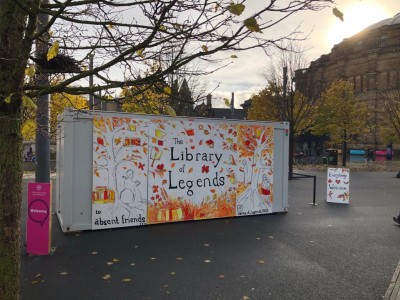 The Library of Legends public installation arrived in Edinburgh to mark the 10th anniversary of the ‘To Absent Friends’ festival.
The Library of Legends public installation arrived in Edinburgh to mark the 10th anniversary of the ‘To Absent Friends’ festival.
The festival is held by the Scottish Partnership for Palliative Care each year as an opportunity to celebrate and remember people who have died. Artists John Martin Fulton and Russell McGovern created the pop-up library and workshop in a portacabin at Potterrow Plaza on November 1-7 this year to give visitors a space to make stories and remember people from their lives who have died.
Below, John Martin Fulton writes up his and Russell's thoughts and experiences of the installation.
For a week in November we welcomed people into our portcabin that was decorated in murals of falling leaves - golden and rusty like those fluttering past our pitch at Potterrow Plaza in the centre of Edinburgh. Our open door beckoned people in to see art, have a cup of tea, or even sit down and draw and paint. The only thing, though, was that all the art and all the stories were about death, grief and loss.
Far from being depressing or gloomy or tragic like you might expect, though, the experience for us and for the visitors was on the whole uplifting. Clearly people had unique experiences in the space but pretty much they agreed on one thing. It made them feel better.
Thoughts of death and grief, we found, are not something to be scared of because they are actually always there. Giving people a chance to not be alone with this was why the library worked.
Before embarking on this project neither my work-partner Russell nor I had any particular predilection for the subject of death in our art. As freelancers we became involved as we answered an open call with what seemed like the most logical of answers. The organisers at SPPC wanted people to share stories about death and loss so surely the most sensible thing, we thought, was to create a library. People could be welcomed to come in to write their stories and remembrances so that others could see they were not alone in their grief.
Plus, to make it accessible to many, we could place this library within a portacabin, in central Edinburgh, put there by a hoist.
Perhaps the reason this all seemed so undaunting was the background we have in community art. Over a decade we have worked with literally hundreds of people and groups using art as a tool to tackle issues ranging from mental illness to the pandemic and their local brick manufacturer. Death would just be another frontier for an art workshop for us, was our thinking.
However, the engagement we felt on this project was the deepest and most connecting we have ever experienced. Whether in groups or as individual visitors, the stream of people opening up and sharing deep moments of creativity was profound.
And far from predictable too.
Enlivening, reassuring, invigorating, comforting and terribly sad in varying measures. It was everything really.
The trade secret of community art is that it is much less about art and much more about community. Getting people to connect to others and the artwork flows, that could be the unofficial adage of the work.
Well, it seemed like opening up this space for sharing grief and expressing feelings about people who have died was the greatest leveller of them all.
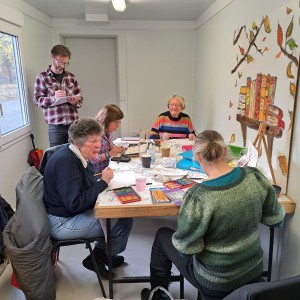 Some examples might show the warm dignity we encountered from people who happened upon us.
Some examples might show the warm dignity we encountered from people who happened upon us.
There was the woman, who came in with family, determined to make a painting all about her friend who had died in the past three months, quite suddenly. Through teary eyes she described a woman who had lived bold as brass but was gone in a second like she had always said she wanted. The woman laughed as she drew champagne bottles, lipstick and other glamourous artefacts from her friend’s life.
“I feel so much better thinking about her. It has been like having a weight lifted remembering her as she was” she said.
Another day, a younger woman wondered in as a refugee from the stormy weather, at first saying nothing but grabbing pencils and paint and working feverishly.
Later she explained she was in the middle of a turbulent time as it was the anniversary of the death of her young friend.
She created art which, to me, touched death as bravely as anything in a national collection.
She began chatting with others as she calmed down and opened up, explaining that if she hadn’t seen the library and come in she would be at home crying in solitude.
“You are all such lovely people. Thank you” she said to the group who sat around the table.
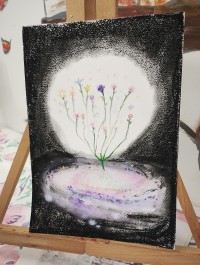 Another visitor, from Thailand, came in telling us how she had already bade farewell to her grandma on her last visit home, as they both expected the elderly woman would die from her illness before they met again. She was in a strange, middle place waiting on death but already grieving. Art helped her reflect.
Another visitor, from Thailand, came in telling us how she had already bade farewell to her grandma on her last visit home, as they both expected the elderly woman would die from her illness before they met again. She was in a strange, middle place waiting on death but already grieving. Art helped her reflect.
The delicate flowers she painted surrounded by black are indelible in the library.
In contrast to these more open experiences were the many visitors who inhabited the space in more the traditional way we are brought up to respect a library space.
Theses visitors expected and exuded quiet, dabbing eyes and sniffing and they pondered the books or painted watercolours with watery eyes themselves. A respectful nod or brief kind word let us know the library had been meaningful for them too.
And there were groups too. Adults with learning disabilities, children from a local school, a neighbourhood group, a group affected by blood borne virus. All of these people opened up and bravely shared parts of themselves with one another that had previously gone unseen. Giving support. Sharing wisdom.
 “I wish I had seen more of my granny before she died,” said one 11-year-old girl.
“I wish I had seen more of my granny before she died,” said one 11-year-old girl.
“It’s not your fault. You were only a child” said a classmate to her.
It would be possible to go on describing these people who came to the library for pages so moving were the sights, but perhaps it would not be appropriate.
Their stories, in any case, will live on in the Library of Legends, which has already been seen by many and is in the careful stewardship of the SPPC for future use.
The experience too will also remain with all of those who visited and with us, the artists, who got to help people use their grief in creativity.
Photo credits (top to bottom): John Martin Fulton and Russell McGovern, Willowbrae Community, John Martin Fulton, Rebecca Patterson, David Mollison, and David Mollison (below).
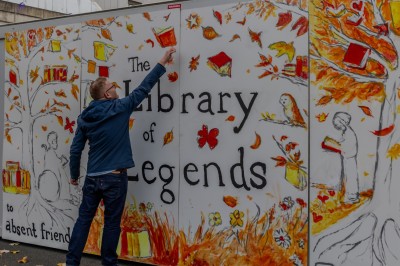
Talk to action on bereavement events
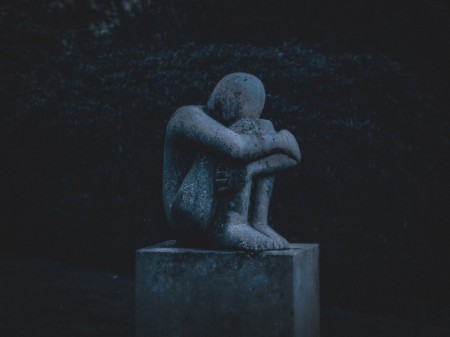 Check out the first in a series of 'Moving from Talk to Action on Bereavement' events to discuss how those of us within bereavement sector in Scotland can work together to achieve positive change.
Check out the first in a series of 'Moving from Talk to Action on Bereavement' events to discuss how those of us within bereavement sector in Scotland can work together to achieve positive change.
The event will take place on 23 January 2024 on Zoom.
Find out more here: Moving from Talk to Action on Bereavement event.
Photo by K. Mitch Hodge on Unsplash
Loss - A sculpture by Jane Mortimer
The Library of Legends
 The Library of Legends is a public art installation that will appear in the centre of Edinburgh from 1-7 November 2023, as part of the To Absent Friends festival.
The Library of Legends is a public art installation that will appear in the centre of Edinburgh from 1-7 November 2023, as part of the To Absent Friends festival.
The Library of Legends is a place where people can go to remember and share stories of people they have lost. It welcomes anyone who wants to share a story or make art about someone who has died.
Visitors are also welcome just to relax, reflect and explore contributions made by previous visitors. On hand to help people find their creativity and share their stories will be artists John Martin Fulton and Russell McGovern. Even if you have no experience or confidence in art they’ll help you find a way to tell the story of your lost loved one if you want to.
drop in
Passersby are welcome to come into the the library, whether to browse the shelves, or to contribute their own story or art work. The Library will be open 10am-4:30pm, 1-7 November. The mystery location of the library will be revealed soon.
pre-book a group visit
1-7 November we’ll be running morning art workshops at the Library for community groups who’d like to contribute their stories and artwork. Email: jmfultonart@gmail to book your group visit.
not in edinburgh? we’ll come to you.
To discuss the artists coming to your venue for a workshop in October, email: jmfultonart@gmail
send us your stories
We want to fill the library with stories and memories and reminicences of all kinds. Send us your stories, poems, pictures, paintings - anything that you’d like to share - and we’ll fill the Library with your Legends. Email: jmfultonart@gmail or post to: Samara Leibner, SPPC, CBC House, 24 Canning Street, Edinburgh, EH3 8EG. We need to receive contributions by 23 October 2023. We welcome contributions from individuals or groups.
Find out more here: Library of Legends
Truacanta Evaluation Report
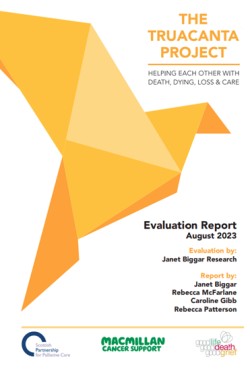 The Truacanta Evaluation Report has been published. The report presents the findings at the end of the project evaluation, and reflects on the impact achieved and learning gained from the project, which ran from 2019-2023.
The Truacanta Evaluation Report has been published. The report presents the findings at the end of the project evaluation, and reflects on the impact achieved and learning gained from the project, which ran from 2019-2023.
You can read the full report here: Truacanta Evaluation Report
The Truacanta Project was set up to support local communities in Scotland who were interested in taking community action to improve people’s experiences of death, dying, loss and care, using a community development approach. The project was funded by Macmillan Cancer Support and run by the Scottish Partnership for Palliative Care.
Groups in Ayrshire, Dundee, Highland, North Berwick and Perthshire were supported through Truacanta to build their own local compassionate community activity. The Evaluation Report shows that
- four out of five of the local projects had clear positive impact at a local level, despite the challenges of establishing a new project during the COVID-19 pandemic.
- progress had been made in all the intended outcome areas set out at the start of the project
- projects have left valuable legacies within their communities
- much local work will be sustained beyond the life of the Truacanta Project
You can find out more about the project here: Truacanta
Scottish Bereavement Summit

The report of the Scottish Bereavement Summit has been published today. The report draws attention to the difficulties faced by people who are grieving in Scotland, and sets out recommendations of how to address some of the key issues.
Access the full report here: Scottish Bereavement Summit Final Report
A summary version of the report is available here: Scottish Bereavement Summit Summary Report
Who supported the summit?
The Scottish Bereavement Summit took place on 13 October 2022. It was supported by a collaboration of organisations working to improve bereavement support in Scotland, including: Richmond’s Hope; Good Life, Good Death, Good Grief; Held in our Hearts; Accord Hospice; The Haven; Kilbryde Hospice; Independent Age; Macmillan Cancer Support; Brightest Start; Bereavement Charter Group; Cruse Scotland; Team Jak; ARC; Fife Young Carers; Funeral Link; Scottish Partnership for Palliative Care; St Vincent’s Hospice; Sands; St Andrew’s Hospice; Marie Curie; MND Scotland; Ardgowan Hospice; Childhood Bereavement Network; Child Bereavement UK; Faith in Older People; Baby Loss Retreat; Sue Ryder; Scottish Care; IANPC; Whyte Family Trust; The Prince & Princess of Wales Hospice; Hospice UK; Alternatives Counselling & Listening Rooms; Sunrise Partnership; St Margaret of Scotland Hospice.
What happened at the Summit?
The Bereavement Summit brought together 136 people who work within the bereavement sector in Scotland. The gathering gave attendees the opportunity to explore how to work together to improve experiences of bereavement in Scotland, focusing on three specific areas:
- Formal bereavement services: how can formal bereavement support services (which provide for example counselling and access to peer support groups) be strengthened and improved?
- Informal bereavement support: what can be done to support communities of all kinds (including workplaces, schools, families and neighbourhoods) to provide better informal support to people who have been bereaved.
- Health and social care staff who experience multiple bereavements: how can staff get the support they need at work.
Recommendations
The Report suggests the following 10 recommendations:
- Improve signposting to available support.
- Increase public awareness, confidence, comfort and skills relating to bereavement issues.
- Ensure strategic direction, accountability and responsibility for improving bereavement support.
- Enable schools and educational institutions to be more supportive of people who are bereaved.
- Address equity/equality issues and improve access to services for people with a range of needs.
- Encourage and support workplaces to be better at supporting bereaved staff.
- Support opportunities for professionals to network, learn and share good practice.
- Improve Bereavement Support for Health and Social Care staff.
- Improve how bereavement services, projects and initiatives are funded.
- Ensure future action is informed by evidence, information and builds on existing work.
Access the full report here: Scottish Bereavement Summit Final Report
A summary version of the report is available here: Scottish Bereavement Summit Summary Report
More information about the Bereavement Summit, including a film of the presentations, is available here: Bereavement Summit outputs.